Corona, Max and us: childbirth in a time of coronavirus
A newborn arrives – and her father chronicles her tenuous first days in a strange new world.
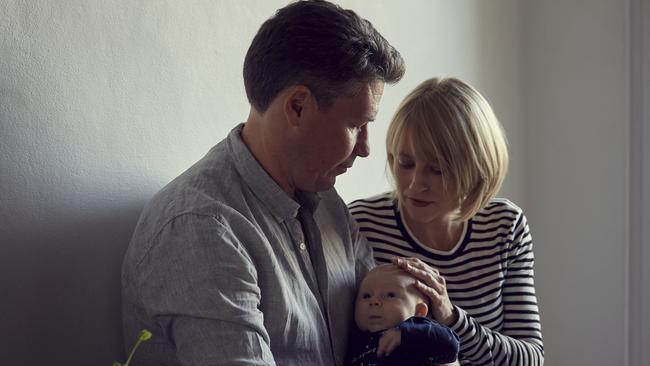
Amy makes a noise I haven’t heard before and I dress quickly in the clothes waiting at the end of the bed. We’ve had eight weeks of lessons to tell us what to do. Wait and be calm. Play music. Watch a movie. Amy’s waters break almost immediately. I get her down the stairs and drive hard along Sydney’s Parramatta Road. At the hospital they do their checks. Contractions every two minutes; 6cm dilated. The midwife finds us a room and I feel a surge of relief that we haven’t been sent home.
Over the next few hours Amy’s fingernails dig deeper into my skin. She asks for an epidural and there is a delay in finding an anaesthetist. By the time the doctor arrives there’s a worry it might be too late. They check again to see what Amy wants. She takes the gas from between her lips and tells them clearly. They prep and the needle slides in. It can take 20 minutes before the drug takes effect, but the difference is almost immediate. Amy tells me to add Fentanyl to our list of names.
Now there is calm. The midwife directs me to a bed but I’m too restless to sleep. I go out into the dawn. There are delivery trucks and the birds have started. I find a coffee cart, order a double shot and sit in the university grounds, in front of a catholic college with a protestant garden. Golden sandstone against green lawn. I sip from a paper cup and make calls to family and friends.
Back in the ward, the midwife is pleased with progress and Amy sleeps. It goes like this for two hours and then gently they start to get things moving. There is a machine that is monitoring the baby’s heartbeat and it struggles to find a pulse. When it does, it’s too slow. Immediately, there are 12 people in the room. A paediatrician gives kindly and authoritative directions. It’s time for theatre.
They order a trolley, but it will take two minutes. Too slow. A nurse hands me a set of scrubs. “Take your clothes off.” I’m left in the anaesthetic bay and instructed to sit in a chair surrounded by trays of syringes and swabs. After a few minutes, the door opens and I’m given a red hair net and told to bring the chair in. I sit and watch as they take their readings and go through their procedures. Commands are given succinctly and responded to immediately. Options are debated. Decisions are made. This is first-rate drama.
They explain they need to get the baby out quickly and propose a sliding scale of interventions. First a ventouse, a suction cup applied to the baby’s now visible head. The window is short. Five contractions only. If it doesn’t work, forceps. If that doesn’t work, a caesarean. The ventouse is applied and it doesn’t hold. They try again. It takes.
They now propose an episiotomy. Amy nods, they give her a local and it’s done within seconds. They guide her through the contractions and tell her when to push, their clinical expressions dropped for sport. OK, push as I count down to zero. You’ve got this. Harder!
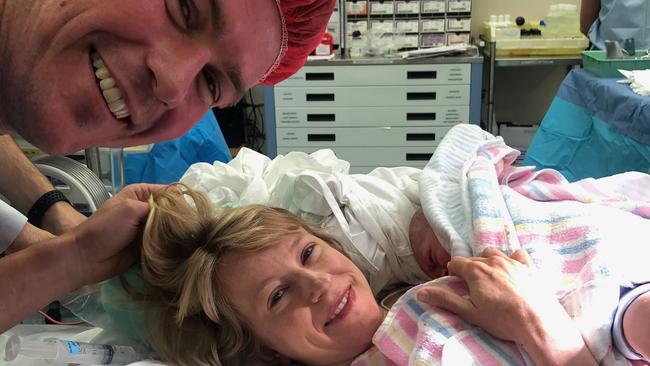
On the fifth they make a swooping gesture and deposit something slimy and pink on Amy’s chest. It’s a girl. She bawls immediately. The paediatrician is briefed on another emergency and leaves without doing any checks. “If she can cry like that, she doesn’t need me.”
Back in the ward, we close the curtains and watch her in the dark. The ventouse has left a red mark on the back of her head, light at the top and darker and bubbled down near her neck. Her features are squashed. There is some red muck over her face and in the beginnings of her hair. She is lying in an awkward position, her arms pinned to her side by a cotton wrap. Now and again her breathing is short and uneven. She is perfect.
We had decided to wait until after the birth before giving her a name, but even after meeting her it’s not easy. We try the options on our list, sounding them out, looking for a response. It doesn’t work. I take the boy’s list and jokingly suggest Max.
The nurses come in periodically. Everything is going well and we discuss timing our discharge. Even though we’ve only been in for a night, it feels like a good time to go. It’s March 4. There are rumours of a new virus. No one really knows how bad it is. A hospital no longer feels like a safe place.
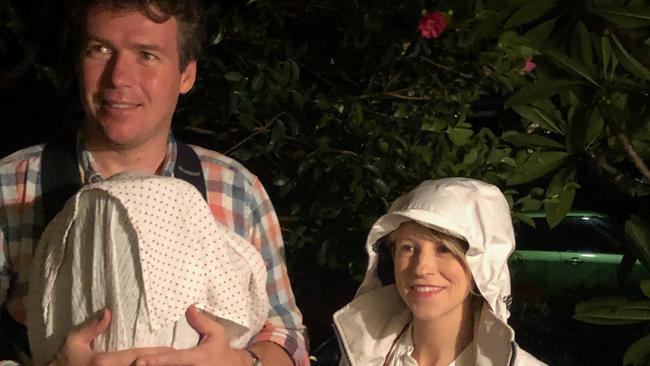
We come back to a house neatly arranged for ababy. I order takeaway and we eat it on the couch, with Max swaddled and sleeping beside us. I suggest we watch one of the movies selected for prelabour: Jurassic Park. It’s pitch perfect, an overacted romp. It climaxes with velociraptors stalking the kitchen with high-pitched, staccato screams.
Max doesn’t sleep. We try a new routine with a split shift, me in the spare room with the travel cot before midnight and Amy in the main bedroom after. In the morning, I sneak Max out.
For weeks Amy had come home from shopping for baby clothes with more socks. But look at them! They’re so tiny! After trying once to put them on, then losing them, I give up. A practical dad friend has given me a one-piece with a zipper that runs from foot to neck. I can have her out of the old one, nappy changed and into a new one in less than a minute. She hates having her nappy changed. Her bottom lip quivers and her screams are high-pitched, punctuated by short breaths.
I put her in a pouch on my chest. She sits slightly higher than a joey with her legs and arms dangling. Although it sounds awkward, she burrows into my chest and falls asleep. When I arrive at the coffee shop, I slip open the side and they fawn over her. Someone holds the arms of her suit that finish well below her hands. “Dressed by her father?” She’s still asleep and her features are calm and soft. “She’s an angel!” I assure them she is a monster.
After watching Amy and Max together I realise that the importance of my help is limited. Max needs Amy more than she needs me. The most useful thing I can do is support Amy and what she needs is rest. I put Max in the pouch and walk for a few hours after dinner. Even though it’s autumn, it’s still warm and there are happy people everywhere. Talking, eating and flirting. I find parks hidden in the suburb I have lived in for years. Basketball courts by the railway line. A cemetery. I’m out too long and by the time I get back Max is hungry. She screams, full of furious life. She grabs Amy’s nipple with both hands and, with legs pumping, tries to shove it in her mouth.
After a week off, I go back to work. It’s a city firm; the majority of employees are men. Work is understanding. They give me extra time and their leave allowances are generous. We are very grateful.
I lie on the couch with Max on my belly and watch the news. Prime Minister Morrison outlines Australia’s plan to deal with Covid-19. It is logical, comprehensive and real money is being spent. He looks exhausted. He stumbles over his words and clutches at a safe metaphor: the bridge. But a bridge is structural and this problem is spatial and temporal. Morrison flounders. Max caterpillars up my chest and snuffles under my chin. With the news fresh, I walk with Max in the pouch and nappies in my pocket. For company, I select the audio version of Rory Stewart’s The Marches. He is the narrator and has a good voice and rhythm. Rory tells me that every walk is a miracle.
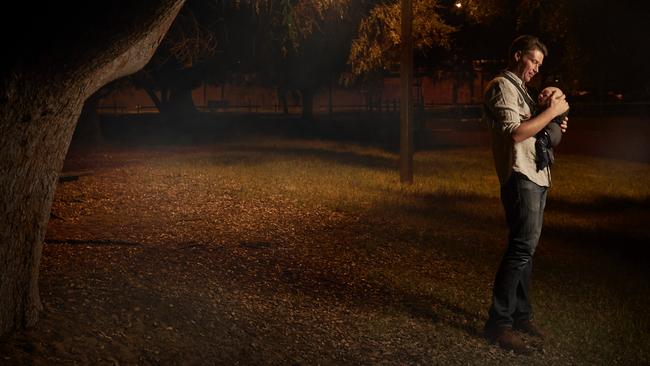
A house comes up for sale in a suburb further south and west than we had hoped. It has two bedrooms, a backyard and at end of the street is a park with play equipment, sport fields and enough discreet bush for snogging and cigarettes. The house needs work, but the bones are there. After years of living in a flat in a building that was once a nursing home, we fall in love with it.
I’m back on the street with Max and Rory. The book is hard to categorise. Part history, part philosophy, part memoir, it is held together by Rory and his father’s relationship. These two men served in the Black Watch, then the diplomatic corps, a generation apart. I think about my own father and our relationship built through work. For us it was fencing, tractors and horses. When Rory describes a problem to his father, I recognise the spirit of the response: “Very good darling. Get on with it.”
The PM announces that non-essential services will cease. There are rules for how many people can be in the same place at the same time. With a new baby we want to introduce to the world, we tell everyone we know not to visit.
It’s night and the streets are empty. I walk without direction hoping to find a train station. It’s the final scene of The Marches. Rory’s father has died. They hold a funeral and it is such a touching scene that I have a little cry on the empty street. Out of the shadows appears a Greek woman, grandmother age. She misinterprets my tears and gestures for me to release the corner of the pouch. Max lies there sleeping with translucent skin. The woman gives her verdict. “She is worth it, my darling.”
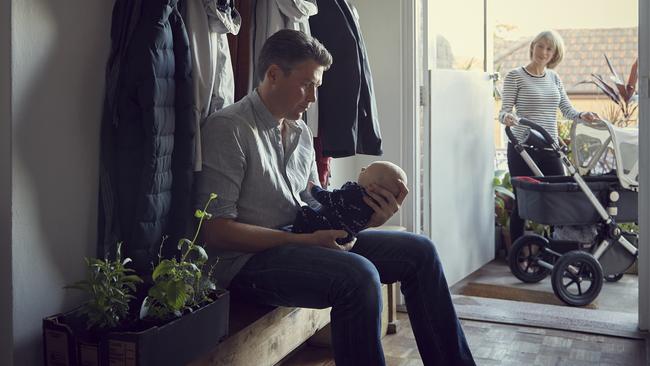
It’s raining on the day of the auction, March 14.In the car we listen to the news. Italy has gone into lockdown. Economists predict a recession. We go over our options. To us this is a medical problem and there will be a medical solution. The market is fine. What we have seen of hospitals and doctors in the last few weeks has given us confidence. We can remember SARS, swine flu and ebola. Our feeling is the coronavirus will pass, too. We are bored with open house inspections. I suggest we revise our maximum bid down slightly and “get on with it”.
I do the bidding with Max in her pouch, covered by my raincoat. When the auctioneer slaps the paper down to say we have won, she doesn’t wake. Later that afternoon we celebrate in a bar with wine and cheese. On Monday, further lockdowns are announced. The sharemarket tanks.
My company asks me to work from home. This is good for me, but it takes discipline not to help around the house. Amy has a shower and leaves Max in a bouncer within reach. I take a conference call and when she starts to grizzle I reach a foot out and rock her gently back to sleep. The very model of a working dad in isolation. When Amy is ready she lifts Max and there is shit up her back, down her legs and all over the cotton slip.
I’m writing this standing at a chest of drawers, Max in her pouch on my chest. The day begins to grey and she starts to whinge. I walk on the spot but she’s not fooled; the movement doesn’t soothe her. I select Einstein on the Beach as tonight’s company, for the poem in its fifth intermezzo.
The day with its cares and perplexities is ended and the night is now upon us.
The night should be a time of peace and tranquillity, a time to relax and be calm.
We have need of a soothing story to banish the disturbing thoughts of the day, to set at rest our troubled minds, and put at ease our ruffled spirits.
And what sort of story shall we hear? Ah, it will be a familiar story, a story that is so very, very old, and yet it is so new. It is the old, old story of love.
I take my squirming miracle into the empty streets for tonight’s walk.

To join the conversation, please log in. Don't have an account? Register
Join the conversation, you are commenting as Logout